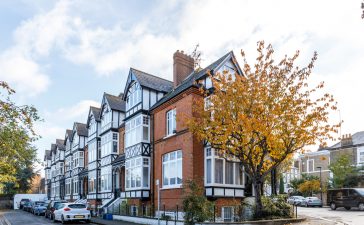Buy-to-let (BTL) is exactly what it sounds like – you buy a property for the purpose of renting it out to tenants. If you’re exploring this route, you should consider a BTL property a medium to long-term investment. If you are a property investor looking to purchase a buy to let property it is more than likely that you will need a buy-to-let mortgage.
Securing the best rates is one of the most important steps when in investing in BTL so you should know the best investment mortgage rates before you proceed. Buy to let mortgages are different from mortgages designed for home-owners which are referred to as residential or homeowner mortgages.
Buy-to-let property investment may be right for you if you:
- Prefer investments that are more reliable than stocks and shares
- Are willing to invest your money for a long period of time
- Understand that property prices can go up as well as come down
- Are willing to take the risk that you might not earn a profit on your investment
- Understand and accept the additional risks associated with borrowing money to buy a property
- Understand and accept the costs and time involved in owning and running a property and the impact that this will have on your potential return.
What is a BTL property investment?
Buy-to-let investment is very different from owning your own home.
Becoming a landlord effectively means running a small business – one with important legal responsibilities.
How does BTL property investment work?
To buy a residential property, you can use your own cash or take out a buy-to-let mortgage with a cash deposit.
Keep in mind that even if you secure the loan on the best investment mortgage rates there are risks associated – if you need to sell the property for a loss, the sale price might not cover all that you owe on the mortgage and you would need to make up the difference.
Also remember, you still need to make your mortgage repayments if your tenants leave and there is no rent coming in
You can potentially earn a profit from a BTL property in two ways:
- Rental yield – this is what your tenant(s) pay in rent, minus any maintenance and running costs, such as repairs and agent fees.
- Capital growth – the profit you earn if you sell your property for more than the cost you bought it for.
Buy to let is a big commitment:
Risk and return
- The amount of rent you can charge depends on a number of factors, which include wider market conditions that are outside your control. Rental rates are not guaranteed.
- If you don’t find tenants, or if you can’t charge the rent you expected, you might struggle with your mortgage repayments.
- If house prices fall, the value of your property is likely to fall as well. You might not be able to sell it for as much as you hoped.
- You’ll have to make up the difference if you have to sell and the sale price doesn’t cover the whole mortgage.
- Major repairs or difficult tenants might increase your costs unexpectedly.
- If the housing market does well, you might be able to sell your property for a profit.
Access to your money
To access your money, you’ll need to sell the property or take out another mortgage. Both take time and a new mortgage would need to be approved by the bank.
Charges
You’ll need to cover the costs of buying, which can include:
- Survey fees
- Solicitor’s fees
- Stamp Duty Land Tax
There are also running and maintenance costs associated with any rental home.
A sales or letting agent will also charge a fee. If you want to use an agent, you should compare costs in order to get the best deal.
Legal and marketing fees will be involved when you sell the property.
Are BTL property investments secure?
There are a few ways to help make your investment more secure.
- Landlord insurance – though it isn’t legally required, taking out a policy can help protect you and your investment.
- Buildings insurance –you’ll need it if you have a buy-to-let mortgage, and it can also help protect your investment
Because property is valuable, you may find yourself targeted by fraudsters.
Tax and BTL properties
Stamp Duty Land Tax, Land and Buildings Transaction Tax, and Land Transaction Tax
You’ll have to pay an extra 3% on top of each Stamp Duty band when you buy an additional home or a residential BTL property. While Stamp Duty doesn’t apply in Scotland and Wales, there are other charges involved
In Scotland, you’ll pay Land and Buildings Transaction Tax (LBTT) when you buy a property. For additional properties you’ll pay an extra 4% in LBTT on top of current rates for each band on properties costing more than £40,000. LBTT is collected by Revenue Scotland.
In Wales, stamp duty land tax was replaced by Land transaction tax (LTT) from April 2018 and is collected by the Welsh Revenue Authority. If you buy an additional residential property, such as second homes and BTL properties, you’ll have to pay an extra 3% in Land Transaction Tax (LTT) on top of current rates for each band on properties costing more than £40,000.
This tax applies to both freehold as well as leasehold properties – whether you’re buying outright or with a mortgage.
Tax relief
You may be required to pay income tax on rental income as well.
Up until the 2016/17 tax year, landlords could deduct mortgage interest and other allowable costs from their rental income, before calculating their tax liability.
Deductions
As a landlord, you can deduct so-called allowable expenses before your tax bill is calculated.
These include:
- Mortgage interest costs (to be affected by new rules from next year)
- Maintenance costs
- Lettings agent fees
- Insurance premiums
- Council tax where applicable
- Utility bills where applicable
Your income tax rate will depend on your net income, i.e., after costs.
Non-resident landlord scheme
The non-resident landlord scheme was set up by HM Revenue and Customs (HMRC) to stop income tax being avoided by non-UK residents renting out a UK property.
You are a non-resident landlord if you have UK rental income and your ‘usual place of abode’ is outside the UK.
Capital Gains Tax
If you make a profit when you sell your buy-to-let property, you’ll be liable to pay Capital Gains Tax.






